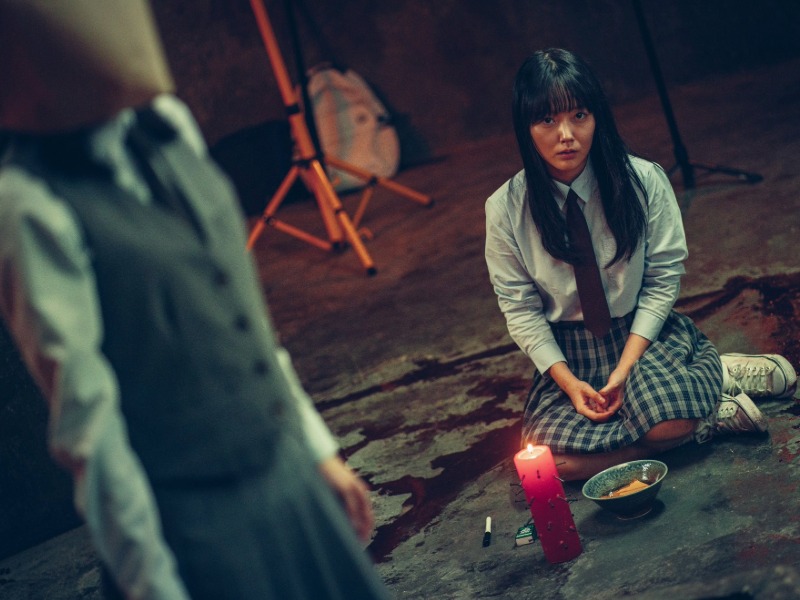The Ghost Game (2025) is a stripped-down, unnerving Korean horror film that draws on classic seance and possession tropes, but updates the formula for a generation obsessed with viral content and online dares. Directed by Son Dong-wan and co-written with Won Hee-Jin, the film features a breakout ensemble of six teens whose pursuit of YouTube stardom quickly descends into supernatural terror and claustrophobic madness.
Premise and Setting
At the core of The Ghost Game is a ritual gone terribly wrong. Ja-yeong, hiding a secret from her past, joins her school friends in a necromancy ceremony designed to summon a spirit and answer personal questions in exchange for notoriety online. The entire story unfolds almost entirely within a single, pentagonal room—a concrete space littered with ominous pillars and a water basin allegedly haunted by evil souls. The film’s minimalist setting heightens the tension, with a sense of dread that builds as the teens ignore warning signs and fail to properly complete the ritual.
Style, Effects, and Atmosphere
Rather than leaning on digital trickery, The Ghost Game is notable for relying on practical effects to deliver its scares, especially during body invasion sequences. A standout moment involves close-up shots of demonic hair crawling into a possessed teen’s mouth, rendered with minimal CGI and clever stop-motion work for maximum shock value. The gloomy, almost claustrophobic room staging makes every scream, echo, and chain rattle reverberate, trapping viewers in the horror alongside the cast.
Teen Dynamics and Psychological Tension
While the initial act is thick with typical high-school drama and interpersonal squabbles—including an annoying love triangle—the film soon refocuses on survival and trust as the haunting escalates. Social media ambitions, peer pressure, and vulnerable secrets play out alongside the supernatural stakes, keeping the emotional beats grounded in adolescent anxieties. Some critics felt the melodrama bogs down the middle section, but most agree that once the horror takes center stage, The Ghost Game becomes far more watchable and unnerving.
Critical Reception
The Ghost Game received praise for its atmospheric design, inventive use of practical effects, and ability to keep viewers guessing. While the film’s reliance on familiar genre tropes led some reviewers to note its formulaic structure, others highlighted the final act’s intensity and creative visuals as standout moments in recent Korean horror. The audience for its particular brand of possession horror skews younger, but genre fans appreciative of minimal CGI and classic setups will find plenty to enjoy.
Overall, The Ghost Game is an effective low-budget horror story that delivers old-school scares in a confined, innovative setting, bolstered by strong practical effects and a rising sense of supernatural menace.
